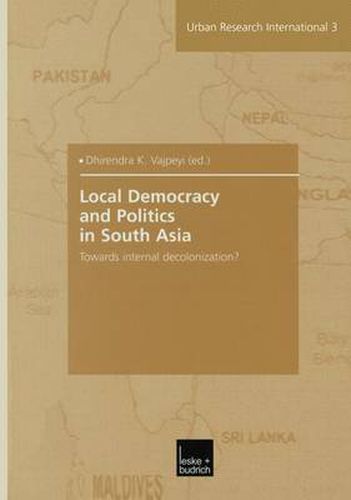Readings Newsletter
Become a Readings Member to make your shopping experience even easier.
Sign in or sign up for free!
You’re not far away from qualifying for FREE standard shipping within Australia
You’ve qualified for FREE standard shipping within Australia
The cart is loading…






This title is printed to order. This book may have been self-published. If so, we cannot guarantee the quality of the content. In the main most books will have gone through the editing process however some may not. We therefore suggest that you be aware of this before ordering this book. If in doubt check either the author or publisher’s details as we are unable to accept any returns unless they are faulty. Please contact us if you have any questions.
I Local Government in the Third World: Legacies of Colonialism To generalize about the nature of politics and political institutions in the vast and complex area as the Third World is an exercise in futility. The countries of the area are different from one another in their levels of social evolution, political development, economic achievement, and technological change; however, most of them have experienced colonialism in the past with varying degrees of exploitation and changes introduced by the colonialists. After gaining independence these countries are attempting to decolonize them selves by establishing new institutions and political systems at national and sub-national levels. The degree of their success has been uneven due to sev eral factors such as the quality of their political elites and their commitment to bring modernization, their economic resources, and last but not least, the degree to which the process of democratization, at all levels of society has been introduced, and internalized by the people themselves. With a few ex ceptions the ghost of colonialism keeps haunting these societies. Due to lack of political-administrative experience, a participatory culture, and weak infra structure the colonial centralized-bureaucratic model of administration has not been replaced. This is more obvious and prevalent in the inter governmental relationships between national, state/province, and local (dis trict) governments. Under the imperial administrative system most of the in digenous institutions of local government and governance such as Panchayats in India were either abolished or became irrelevant and ineffective.
$9.00 standard shipping within Australia
FREE standard shipping within Australia for orders over $100.00
Express & International shipping calculated at checkout
This title is printed to order. This book may have been self-published. If so, we cannot guarantee the quality of the content. In the main most books will have gone through the editing process however some may not. We therefore suggest that you be aware of this before ordering this book. If in doubt check either the author or publisher’s details as we are unable to accept any returns unless they are faulty. Please contact us if you have any questions.
I Local Government in the Third World: Legacies of Colonialism To generalize about the nature of politics and political institutions in the vast and complex area as the Third World is an exercise in futility. The countries of the area are different from one another in their levels of social evolution, political development, economic achievement, and technological change; however, most of them have experienced colonialism in the past with varying degrees of exploitation and changes introduced by the colonialists. After gaining independence these countries are attempting to decolonize them selves by establishing new institutions and political systems at national and sub-national levels. The degree of their success has been uneven due to sev eral factors such as the quality of their political elites and their commitment to bring modernization, their economic resources, and last but not least, the degree to which the process of democratization, at all levels of society has been introduced, and internalized by the people themselves. With a few ex ceptions the ghost of colonialism keeps haunting these societies. Due to lack of political-administrative experience, a participatory culture, and weak infra structure the colonial centralized-bureaucratic model of administration has not been replaced. This is more obvious and prevalent in the inter governmental relationships between national, state/province, and local (dis trict) governments. Under the imperial administrative system most of the in digenous institutions of local government and governance such as Panchayats in India were either abolished or became irrelevant and ineffective.